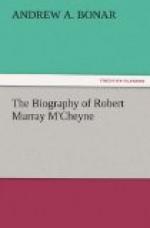It was probably, in some degree, his experience at this time that gave him such deep sympathy with the Church Extension Scheme, as a truly noble and Christian effort for bringing the glad tidings to the doors of a population who must otherwise remain neglected, and were themselves willing so to live and die. He conveyed his impressions on this subject to a friend abroad, in the following terms: “There is a soul-destroying cruelty in the cold-hearted opposition which is made to the multiplication of ministers in such neglected and overgrown districts as these. If one of our Royal Commissioners would but consent to undergo the bodily fatigue that a minister ought to undergo in visiting merely the sick and dying of Larbert (let alone the visitation of the whole, and preparation for the pulpit), and that for one month, I would engage that if he be able to rise out of his bed by the end of it, he would change his voice and manner at the Commission Board.”
A few busy weeks passed over, occupied from morning to night in such cares and toils, when another part of the discipline he was to undergo was sent. In the end of December, strong oppression of the heart and an irritating cough caused some of his friends to fear that his lungs were affected; and for some weeks he was laid aside from public duty. On examination, it was found that though there was a dulness in the right lung, yet the material of the lungs was not affected. For a time, however, the air-vessels were so clogged and irritated, that if he had continued to preach, disease would have quickly ensued. But this also was soon removed, and, under cautious management, he resumed his work.
This temporary illness served to call forth this extreme sensitiveness of his soul to the responsibilities of his office. At its commencement—having gone to Edinburgh “in so sweet a sunshine morning that God seemed to have chosen it for him”—he wrote to Mr. Bonar: “If I am not recovered before the third Sabbath, I fear I shall not be able to bear upon my conscience the responsibility of leaving you any longer to labor alone, bearing unaided the burden of 6,000 souls. No, my dear sir, I must read the will of God aright in his providence, and give way, when He bids me, to fresh and abler workmen. I hope and pray that it may be his will to restore me again to you and your parish, with a heart tutored by sickness, to speak more and more as dying to dying.” Then, mentioning two of the sick: “Poor A.D. and C.H., I often think of them. I can do no more for their good, except pray for them. Tell them that I do this without ceasing.”




